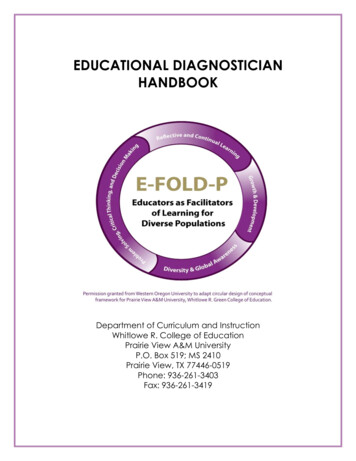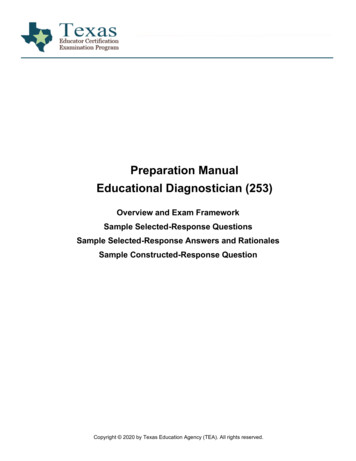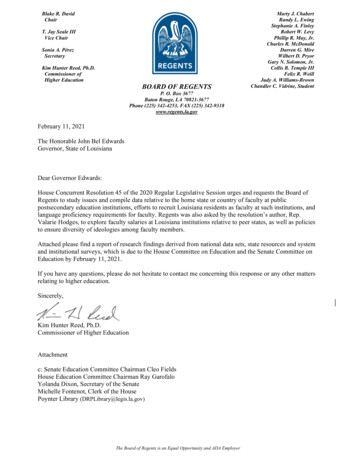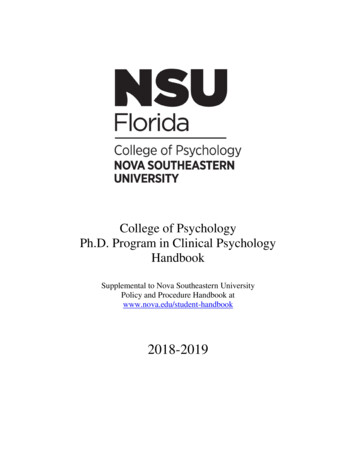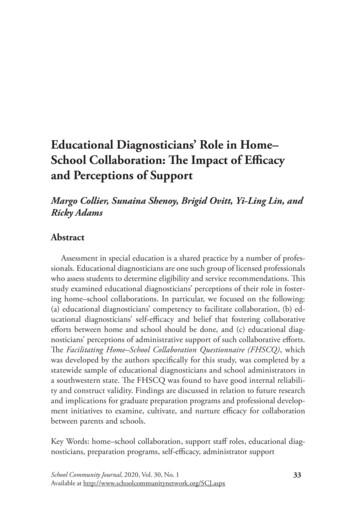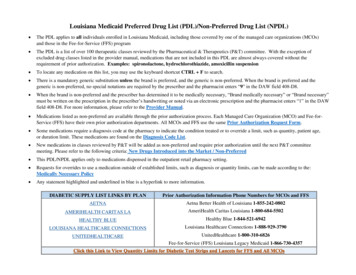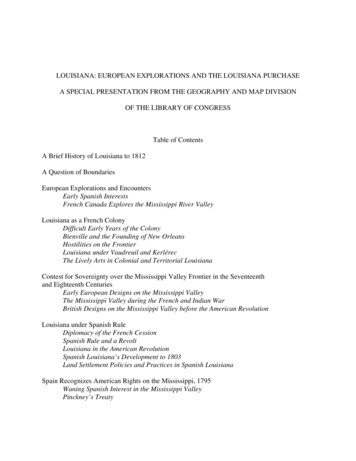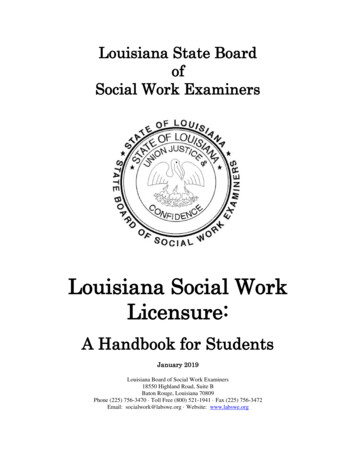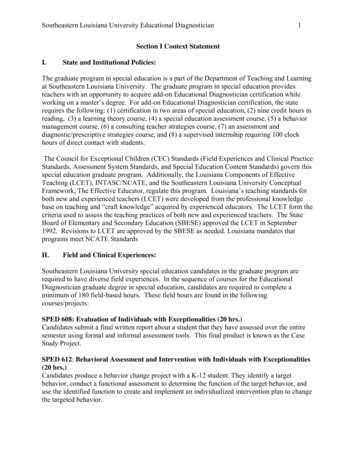
Transcription
Southeastern Louisiana University Educational Diagnostician1Section I Context StatementI.State and Institutional Policies:The graduate program in special education is a part of the Department of Teaching and Learningat Southeastern Louisiana University. The graduate program in special education providesteachers with an opportunity to acquire add-on Educational Diagnostician certification whileworking on a master’s degree. For add-on Educational Diagnostician certification, the staterequires the following: (1) certification in two areas of special education, (2) nine credit hours inreading, (3) a learning theory course, (4) a special education assessment course, (5) a behaviormanagement course, (6) a consulting teacher strategies course, (7) an assessment anddiagnostic/prescriptive strategies course, and (8) a supervised internship requiring 100 clockhours of direct contact with students.The Council for Exceptional Children (CEC) Standards (Field Experiences and Clinical PracticeStandards, Assessment System Standards, and Special Education Content Standards) govern thisspecial education graduate program. Additionally, the Louisiana Components of EffectiveTeaching (LCET), INTASC/NCATE, and the Southeastern Louisiana University ConceptualFramework, The Effective Educator, regulate this program. Louisiana’s teaching standards forboth new and experienced teachers (LCET) were developed from the professional knowledgebase on teaching and “craft knowledge” acquired by experienced educators. The LCET form thecriteria used to assess the teaching practices of both new and experienced teachers. The StateBoard of Elementary and Secondary Education (SBESE) approved the LCET in September1992. Revisions to LCET are approved by the SBESE as needed. Louisiana mandates thatprograms meet NCATE StandardsII.Field and Clinical Experiences:Southeastern Louisiana University special education candidates in the graduate program arerequired to have diverse field experiences. In the sequence of courses for the EducationalDiagnostician graduate degree in special education, candidates are required to complete aminimum of 180 field-based hours. These field hours are found in the followingcourses/projects:SPED 608: Evaluation of Individuals with Exceptionalities (20 hrs.)Candidates submit a final written report about a student that they have assessed over the entiresemester using formal and informal assessment tools. This final product is known as the CaseStudy Project.SPED 612: Behavioral Assessment and Intervention with Individuals with Exceptionalities(20 hrs.)Candidates produce a behavior change project with a K-12 student. They identify a targetbehavior, conduct a functional assessment to determine the function of the target behavior, anduse the identified function to create and implement an individualized intervention plan to changethe targeted behavior.
Southeastern Louisiana University Educational Diagnostician2SPED 613: Consulting Teacher Strategies (20 hrs.)Candidates design prereferral interventions and collaborate with classroom teachers in theimplementation of these interventions. Candidates also implement academic interventionstrategies with individual students and small groups in reading, math, spelling, and writtenexpression. These interventions are geared to the two levels of Response to Intervention.SPED 614: Assessment and Diagnostic/Prescriptive Strategies of Individuals withExceptionalities (20 hrs.) Candidates submit two written case study reports demonstrating theirknowledge of the assessment process and their ability to use the assessment information obtainedto make appropriate educational recommendations.SPED 616: Supervised Internship in Evaluation of Individuals with Exceptionalities (100child-contact hours) Candidates administer and score a variety of formal and informal tests.They complete four comprehensive evaluations of children with learning problems. They alsoconsult with classroom teachers and provide support services for students suspected of havingexceptionalities.All field experiences are monitored by fully licensed special education faculty members atSoutheastern Louisiana University. The field hours are purposefully selected andsequenced to provide experiences that begin with introductory level requirements andmove developmentally to increasingly complex experiences. It should be noted that fieldexperience evaluations for most courses are completed and stored electronically in PassPort.III.Criteria for Admission, Retention, and Exit:Admission: Admission to the graduate special education program is based on the screeningfactors described in the following section. First, candidates must apply for admission toSoutheastern’s Graduate School. Transcripts indicating that a baccalaureate degree was earned ina properly certified area of education must be sent to Records and Registration. In order to beadmitted to pursue graduate studies in the Department of Teaching and Learning, Master ofEducation in Special Education Program, individuals must have at least a 2.5 undergraduategrade point average (GPA). A formula taking the undergraduate GPA x 200 points plus theverbal and the quantitative scores from the Graduate Record Exam (GRE) is incorporated todetermine at what level the candidate is accepted in to the program. All candidates must achieveat least a total of 1250 points using the above formula. If the candidate achieves 1250 – 1349points, they are accepted conditionally. Additionally if candidates maintain a 3.0 average, afterthe initial 12 hours, their status is changed to regular admission status. Graduate candidatesachieving a minimum of 1350 points initially, receive regular admission status. All candidatespursing graduate studies at Southeastern Louisiana University must maintain a 3.0 GPA in orderto remain in good standing.Retention: Several strategies are employed to support candidates in the graduate specialeducation program at Southeastern. The primary support tool is advising. Individuals admittedinto the graduate program in special education meet with a graduate advisor who explains allcourse requirements as well as the comprehensive exam requirement for successful completion
Southeastern Louisiana University Educational Diagnostician3of the Master’s in Special Education, Educational Diagnostician degree. Candidates areencouraged to maintain frequent contact with their advisor by course instructors as well as othersin the Department of Teaching and Learning. In addition to advising, candidates meet frequentlyone-on-one with course instructors to address difficulties in a class as well as in the program.Finally, candidates are provided with professional development opportunities such as the MockIEP and the Dyslexia Simulation to name just a few.Exit: In order to successfully exit the graduate program in special education, candidates mustcomplete the comprehensive exam. This exam consists of four questions. All candidates mustanswer a general special education question and an educational research question. Additionally,candidates select two of three questions from the areas of behavior management,interventions/collaboration, or assessment which are specifically designed for EducationalDiagnostician candidates. Finally, in order to achieve certification, candidates must meet theState of Louisiana requirements for Educational Diagnosticians. The master’s degree program isaligned with these requirements. In addition to the requirements for the special educationprogram, candidates must meet the following requirements for the graduate school: Complete the curricula prescribed for the program area. Have filed a completed Admission to Candidacy for the Degree form. Have earned a cumulative 3.0 GPA in all graduate work and have earned no more than 6semester hours of “C” grades in course work that count toward their degree. Be recommended for the degree by the faculty committee, department head, andGraduate Dean. Be approved for the degree by the Graduate Dean. Have settled all University accounts.IV.Description of Relationship of Program to Unit’s Conceptual Framework:The unit adopted a revised Conceptual Framework in 2005. The Conceptual Framework iscomprised of four critical components of The Effective Educator: Professional Standards (PS),Knowledge of Learner (KL), Strategies and Methods (SM), and Content Knowledge (CK). Theconceptual framework provides direction for the development of effective professionals in theirefforts to successfully plan, develop, and implement curricula to meet the needs of diverselearners in today’s world. Diversity is an integral part of each component, and Technology isemphasized throughout all programs in the educational unit (diversity) (technology).The Conceptual Framework provides the foundation for the graduate program in specialeducation. Faculty in the special education program have long believed that the standards setforth by the CEC, research-based strategies and methods, a firm foundation of contentknowledge, and an understanding of learners must all be successfully integrated to createeffective Educational Diagnosticians.All courses implemented in the graduate special education program project these core beliefs andvalues. Interwoven throughout all courses and field experiences are opportunities for candidatesto be exposed to, and problem solve in, diverse settings and with diverse populations. With thewide range of diverse experiences students bring to the classroom, our graduate candidates must
Southeastern Louisiana University Educational Diagnostician4be prepared with not only knowledge about cultural and linguistic diversity, but also an array ofstrategies/methods to meet the unique needs of students with disabilities in their roles asEducational Diagnosticians.Candidates in the Educational Diagnostician program are provided with numerous opportunitiesfor experiences in diverse settings as they learn about the roles and responsibilities ofEducational Diagnosticians. As they administer formal and informal assessments to students,interview teachers and parents, implement observations, participate in School Building LevelCommittee (SBLC) meetings and staffing meetings, they must have an in depth knowledge ofthe learner, use appropriate strategies and methods, display in depth knowledge in this area ofspecialization, and incorporate professional standards as they learn to practice effectively asEducational Diagnosticians.The table below aligns the CEC Standards, the LCET, and the Conceptual Framework:CEC StandardsStandard 1FoundationsStandard 2Development and Characteristics ofLearnersStandard 3Individual Learning DifferencesStandard 4Instructional StrategiesStandard 5Learning Environments and SocialInteractionsStandard 6LanguageStandard 7Instructional PlanningStandard 8AssessmentStandard 9Professional and Ethical PracticeStandard 10CollaborationLCETCFPlanningCK, KLPlanning, Management,Instruction, SchoolImprovementPlanning, Management,InstructionPlanning, Management,InstructionPlanning, Management,InstructionCK, KL, DPlanning, InstructionCK, PS, KL, SM, D,TCK, PS, KL, SM, D,TCK, PS, KL, DPlanning, Management,InstructionPlanning, AssessmentCK, KL, DCK, PS, KL, SM, D,TCK, PS, KL, SM, D,TProfessional Development,School ImprovementPS, KL, DProfessional DevelopmentCK, KL, PS, D, TV.Indication of whether the program has a unique set of program assessments, whichare different from those expected for the unit’s assessment system, and the relationship ofthe program’s assessments with the unit’s assessment system.This special education graduate program is an advanced program and relies primarily on uniqueprogram assessments based on CEC standards and state certification requirements for
Southeastern Louisiana University Educational Diagnostician5Educational Diagnosticians. Candidates are already certified teachers when they enter theprogram and it is expected that they have previously mastered CEC competencies for entry intothe profession.The special education graduate program uses the following program specific assessments: Comprehensive examGraduate Exit SurveyStructured InterviewTo supplement the above assessments, the special education graduate program for educationaldiagnosticians uses the following course-specific assessments:SPED 613: One assessment for this course focuses on the candidates’ ability to design prereferral interventions based on student needs identified through assessment. This assessment isdescribed in Section IV.SPED 614: One assessment for this course focuses on the candidates’ ability to assess students,design and implement interventions, and make recommendations. This assessment is describedin Section IV.SPED 616: Candidates complete a variety of assignments for this practicum. One assignment,the Final Case Study, requires candidates to complete four comprehensive evaluations forchildren with learning problems. For each comprehensive evaluation, the candidate administers abattery of formal and informal tests and writes an integrated report which includes interpretationof performance and instructional recommendations. The Standardized Test Observation rubric(aligned with CEC standards) is used to assess candidates’ competency in test administration andscoring.The assessments listed above closely compliment the unit assessments and reflect standards forEducational Diagnosticians.
Southeastern Louisiana University Educational Diagnostician6Attachment 1.ASPED Educational Diagnostician CompletersCandidates Enrolled in ProgramAcademic Year2003 – 20042004 – 20052005 – 2006# of Candidates Enrolled in the Program044Candidates Completing Comprehensive ExamAcademic Year2003 – 20042004 – 20052005 – 2006TotalsPass/Fail # and %Concentration AreaPass#/Fail # Pass%/Fail%30 100%0% Educational Diagnostician30 100%0%NCATE uses the Title II definition for program completers. Program completers are persons who have met all therequirements of a state-approved teacher preparation program. Program completers include all those who aredocumented as having met such requirements. Documentation may take the form of a degree, institutionalcertificate, program credential, transcript, or other written proof of having met the program’s requirement
Southeastern Louisiana University Educational Diagnostician7
Southeastern Louisiana University Educational Diagnostician8ATTACHMENT 1.BFaculty InformationDirections: Complete the following information for each faculty member responsible for professional coursework, clinicalsupervision, or administration in this program.FacultyMemberNameHighest Degree, Field,& UniversityAssignment:Indicate therole of , SonyaB.S. University ofFacultySouthwestern Louisiana,M.Ed. Boston University,Ph.D., University OfNew OrleansProfessorYesRatcliff, EllenPh.D. Louisiana StateUniversity M.Ed.AssistantProfessorYesFacultyScholarship, Leadershipin ProfessionalAssociations, and Service:List up to 3 majorcontributions in the last 3yearsThree publications innational peer-reviewedjournals: TeacherEducation and SpecialEducation (2006), Journalfor the Liberal Arts &Sciences (2005), Education(2005);W.L. Billups EndowedProfessor; Member-atLarge, Executive Board,Southwest EducationalResearch Association;Reviewer, ClassroomAssessment (SIG)proposals for 2007 AERAAnnual Meeting, andAACTE 2007 AnnualConventionPast Treasurer - LouisianaCouncil for ExceptionalTeaching orotherprofessionalexperience inP - 12 schoolsCertifiedMild/ModerateDisabilities (112),Severe/ProfoundDisabilities (112), EducationalDiagnostician,ReadingSpecialist; 13years teachingexperience ininner cityschools (Detroit,MI; NewOrleans, LA)SpecialEducation
Southeastern Louisiana University Educational Diagnostician9Southeastern LouisianaUniversity B.S.Mississippi StateUniversitySiegel, WendyDoctorate SpecialEducation andHabilitative Services1999 University of NewOrleans; Master's SpecialEducation andHabilitative ServicesUniversity of NewOrleans; Bachelor ofSciences CorporateFinance University ofAlabama in TuscaloosaFacultyAssistantProfessorYesVan der Jagt,JohanB.A. PsychologyFacultyWestern MarylandCollege 1975 M.Ed.Special EducationWestern MarylandCollege 1978 Ph.D.Special EducationMild/Mod. LD SouthernUniversity- Baton Rouge,LA 1997AssistantProfessorYesChildren; Past FinancialChairperson - LouisianaCouncil for ExceptionalChildren;Mild/ModerateDisabilities (112), EducationalDiagnosticianFour Publications inInternational, National,State referred journals: ReVision (2004)(Invited),American Association ofSchool AdministratorsJournal of Scholarship &Practice (in press),Education (2006), ReadingExploration and Discovery(READ) (2005). InvitedKeynote Speaker at the2005 Positive BehaviorSupport RegionalConference, Cincinnati,OH.Publication: van der Jagt,and Madison, M.Addressing LowSocioeconomic StatusLanguage Factors forIncreased TeachingEffectiveness.-TheInternational Journal ofLearning. Member of:Council for ExceptionalChildren; Mid-SouthEducational ResearchSpecialEducationMild/ModerateDisabilities (112); Curriculumand Instruction(ReadingSpecialist),middle and highschool specialeducation17 and ½ yearsof teaching inresource andinclusiveclassrooms.
Southeastern Louisiana University Educational DiagnosticianRheams, TheresaB.A. ElementaryEducation M.Ed. SpecialEducation Ph.D. ciation (MSERA);Council for LearningDisabilities; Council forRural Special Education;Tangipahoa DyslexiaAssociation;Program Reviewer forMSERA (3 years);Student Council ForExceptional Children CoAdvisor (3 years).Presented at DEC andNAEYC numerous times;Member of CEC, DEC,NAEYC; Past-President ofLouisiana DEC2 years teachingKindergarten, 2years FirstGrade, 4 yearsteaching EarlyChildhoodSpecialEducation, 2years teachingKindergarten
Southeastern Louisiana University Educational DiagnosticianAttachment 1C. List of Required CoursesMaster of EducationGraduate Degree PlanConcentration: Special Education, Educational DiagnosticianUndergraduatedeficiencies to beremoved:Graduate CurriculumCoursesSPED 581SPED 602SPED 612Courses to betransferred:The Exceptional FamilySeminar in Special EducationBehavioral Assessment andIntervention with Individuals withExceptionalitiesSPED 608Evaluation of Individuals withExceptionalitiesSPED 613Consulting Teacher StrategiesSPED 614Assessment and Diagnostic/PrescriptiveStrategies of Individuals withExceptionalitiesSPED 616Supervised Internship in Evaluation ofIndividuals with ExceptionalitiesSPED 616Repeated for a total of 6 hrs.EDF 600Educational ResearchEDF 607 or 615 Philosophy of Education or History ofEducationEPSY 605The Psychological Foundations of HumanLearningEDUC 661Diagnostic and Prescriptive Reading11
Southeastern Louisiana University Educational DiagnosticianGeneral Notes:Other Degree Requirements:12
Southeastern Louisiana University Educational Diagnostician13SECTION II— LIST OF ASSESSMENTS Educational DiagnosticianIn this section, list the 6-8 assessments that are being submitted as evidence for meeting the CEC standards. All programs mustprovide a minimum of six assessments. If your state does not require a state licensure test in the content area, you must substitutean assessment that documents candidate attainment of content knowledge in #1 below. For each assessment, indicate the type orform of the assessment and when it is administered in the program.Name of Assessment 11[Licensure assessment, or other content-basedassessment]2[Assessment of content knowledge in specialeducation]Type orForm of Assessment 2When the AssessmentIs Administered 3Performance-based Assessment RubricSPED 616, Supervised Internship in Evaluation ofIndividuals with ExceptionalitiesPerformance-based RubricAt the end of the programPerformance-based RubricSPED 614Performance-based RubricSPED 616: Supervised Internship in Evaluation ofIndividuals with ExceptionalitiesPerformance-based RubricSPED 613Performance-based RubricSPED 616: Supervised Internship in Evaluation ofIndividuals with ExceptionalitiesStandardized Test Observation for Final Case StudyContent Assessment: Comprehensive Examination3[Assessment of candidate ability to planinstruction]Assessment of Candidate Ability to Design and PlanInterventions: Assessment for Intervention CaseStudy4[Assessment of student teaching]Clinical Practice Assessment: SPED 616, SupervisedInternship in Evaluation of Individuals withExceptionalities5[Assessment of candidate effect on studentlearning]Candidate Impact on Student Learning throughInterventions61Additional assessment that addresses CECstandards (required) ]Identify assessment by title used in the program; refer to Section IV for further information on appropriate assessment to include.Identify the type of assessment (e.g., essay, case study, project, comprehensive exam, reflection, state licensure test, portfolio).3Indicate the point in the program when the assessment is administered (e.g., admission to the program, admission to student teaching/internship, requiredcourses [specify course title and numbers], or completion of the program).2
Southeastern Louisiana University Educational DiagnosticianName of Assessment 1School Building Level Committee (SBLC) MeetingReport Summary7Additional assessment that addresses CECstandards (optional) ]8Additional assessment that addresses CECstandards (optional) ]Type orForm of Assessment 214When the AssessmentIs Administered 3
Southeastern Louisiana University Educational Diagnostician15SECTION III—RELATIONSHIP OF ASSESSMENT TO STANDARDSFor each CEC standard on the chart below, identify the assessment(s) in Section II that address the standard. One assessment mayapply to multiple CEC standards.APPLICABLE ASSESSMENTS FROMSECTION IICEC STANDARDFIELD EXPERIENCES AND CLINICAL PRACTICE STANDARDInformation should be provided in SectionSpecial education candidates progress through a series of developmentally sequenced field experiencesI (Context) to address this standard.for the full range of ages, types and levels of abilities, and collaborative opportunities that areappropriate to the license or roles for which they are preparing. These field and clinical experiences aresupervised by qualified professionals.CONTENT STANDARDS1. Foundations. Special educators understand the field as an evolving and changing discipline X#1X#2 X#3 X#4based on philosophies, evidence-based principles and theories, relevant laws and policies, diverse and#7#8 #6historical points of view, and human issues that have historically influenced and continue to influence X#5the field of special education and the education and treatment of individuals with exceptional needs bothin school and society. Special educators understand how these influence professional practice,including assessment, instructional planning, implementation, and program evaluation. Special educatorsunderstand how issues of human diversity can impact families, cultures, and schools, and how thesecomplex human issues can interact with issues in the delivery of special education services. Theyunderstand the relationships of organizations of special education to the organizations and functionsof schools, school systems, and other agencies. Special educators use this knowledge as a ground uponwhich to construct their own personal understandings and philosophies of special education. Beginning special educators demonstrate their mastery of this standard through the mastery of the CECCommon Core Knowledge and Skills, as well as through the appropriate CEC Specialty Area(s)Knowledge and Skills for which the program is preparing candidates.2. Development and Characteristics of Learners. Special educators know and demonstraterespect for their students first as unique human beings. Special educators understand the similaritiesand differences in human development and the characteristics between and among individuals withand without exceptional learning needs (ELN)1/. Moreover, special educators understand howexceptional conditions can interact with the domains of human development and they use thisknowledge to respond to the varying abilities and behaviors of individual’s with ELN. Specialeducators understand how the experiences of individuals with ELN can impact families, as well as theindividual’s ability to learn, interact socially, and live as fulfilled contributing members of theX#1 X#2X#5 #6 x#3 X#4 #7 #8
Southeastern Louisiana University Educational DiagnosticianCEC STANDARD16APPLICABLE ASSESSMENTS FROMSECTION IIcommunity.Beginning special educators demonstrate their mastery of this standard through the mastery of the CECCommon Core Knowledge and Skills, as well as through the appropriate CEC Specialty Area(s)Knowledge and Skills for which the preparation program is preparing candidates.3. Individual Learning Differences. Special educators understand the effects that an exceptionalcondition2/ can have on an individual’s learning in school and throughout life. Special educatorsunderstand that the beliefs, traditions, and values across and within cultures can affect relationshipsamong and between students, their families, and the school community. Moreover, special educators areactive and resourceful in seeking to understand how primary language, culture, and familialbackgrounds interact with the individual’s exceptional condition to impact the individual’s academicand social abilities, attitudes, values, interests, and career options. The understanding of these learningdifferences and their possible interactions provides the foundation upon which special educatorsindividualize instruction to provide meaningful and challenging learning for individuals with ELN.Beginning special educators demonstrate their mastery of this standard through the mastery of the CECCommon Core Knowledge and Skills, as well as through the appropriate CEC Specialty Area(s)Knowledge and Skills for which the program is preparing candidates.4. Instructional Strategies. Special educators posses a repertoire of evidence-based instructionalstrategies to individualize instruction for individuals with ELN. Special educators select, adapt, anduse these instructional strategies to promote positive learning results in general and specialcurricula3/ and to appropriately modify learning environments for individuals with ELN. Theyenhance the learning of critical thinking, problem solving, and performance skills of individualswith ELN, and increase their self-awareness, self-management, self-control, self-reliance, and selfesteem. Moreover, special educators emphasize the development, maintenance, and generalization ofknowledge and skills across environments, settings, and the lifespan.Beginning special educators demonstrate their mastery this standard through the mastery of the CECCommon Core Knowledge and Skills, as well as through the appropriate CEC Specialty Area(s)Knowledge and Skills for which the program is preparing candidates.5. Learning Environments and Social Interactions. Special educators actively create learningenvironments for individuals with ELN that foster cultural understanding, safety and emotional wellbeing, positive social interactions, and active engagement of individuals with ELN. In addition, specialeducators foster environments in which diversity is valued and individuals are taught to live #1 #2 x#3 x#4x#5 #6 #7 #8 #1 #2 X#3 X#4X#5 #6 #7 #8 #1 #2 X#3 X#4X#5 #6 #7 #8
Southeastern Louisiana University Educational DiagnosticianCEC STANDARDharmoniously and productively in a culturally diverse world. Special educators shape environments toencourage the independence, self-motivation, self-direction, personal empowerment, and selfadvocacy of individuals with ELN. Special educators help their general education colleaguesintegrate individuals with ELN in regular environments and engage them in meaningful learningactivities and interactions. Special educators use direct motivational and instructional interventionswith individuals with ELN to teach them to respond effectively to current expectations. When necessary,special educators can safely intervene with individuals with ELN in crisis. Special educatorscoordinate all these efforts and provide guidance and direction to paraeducators and others, such asclassroom volunteers and tutors.Beginning special educators demonstrate their mastery of this standard through the mastery of the CECCommon Core Knowledge and Skills, as well as through the appropriate CEC Specialty Area(s)Knowledge and Skills for which the preparation program is preparing candidates.6. Language. Special educators understand typical and atypical language development and the waysin which exceptional conditions can interact with an individual’s experience with and use of language.Special educators use individualized strategies to enhance language development and teachcommunication skills to individuals with ELN. Special educators are familiar with augmentative,alternative, and assistive technologies to support and enhance communication of individuals withexceptional needs. Special educators match their communication methods to an individual’s languageproficiency and cultural and linguistic differences. Special educators provide effective language modelsand they use communication strategies and resources to facilitate understanding of subject matter forindividuals with ELN whose primary language is not English.Beginning special educators demonstrate their mastery of language for and with individuals with ELNthrough the mastery of the CEC Common Core Knowledge and Skills, as well as through the appropriateCEC Specialty Area(s) Knowledge and Skills for which the preparation program is preparing candidates.7. Instructional Planning. Individualized decision-making and instruction is at the center ofspecial education practice. Special educators develop long-range individualized instructional
Southeastern Louisiana University Educational Diagnostician 1 Section I Context Statement I. State and Institutional Policies: The graduate program in special education is a part of the Department of Teaching and Learning . teachers with an opportunity to acquire add-on Educational Diagnostician certification while working on a master's .
